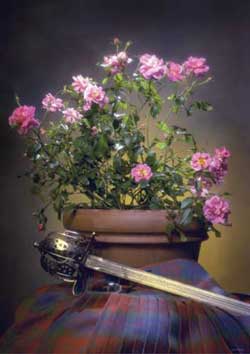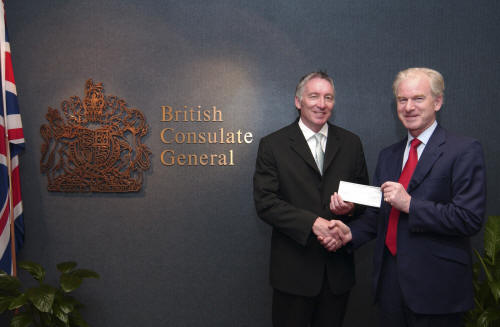Visit their web site at
www.sfu.ca/scottish.
Leith
Davis, Professor of English at Simon Fraser University, is the
current director of the Centre. She is the author of Acts of Union:
Scotland and the Negotiation of the British Nation, 1707-1830 and
Music, Postcolonialism, Gender: The Construction of Irish National
Identity 1725-1874 as well as co-editor of Scotland and the Borders
of Romanticism. She has also published numerous articles on the
poems of Ossian, Robert Burns and other aspects of eighteenth- and
nineteenth-century Scottish and Irish literature and culture.
Why Scottish Studies?
 Historical and contemporary
Scotland resonates with themes that have important connections with
Canada. Lying next to its own elephant with a shorter but just as
undefended border, modern Scotland has managed to retain its unique
identity and create a diverse economy and a vibrant culture. Especially
relevant to contemporary political concerns, Scotland has chosen to
sustain this national identity, economy and culture through a process of
devolution rather than separation—a “stateless nationhood” which may
provide an important model for a new 21st century nationalism
or transnationalism. British Columbians, living in a diverse
multi-ethnic community, and in a country with two founding nations,
could clearly benefit from an on-going examination of this evolving
Scottish relationship with England and with the European Community.
Historical and contemporary
Scotland resonates with themes that have important connections with
Canada. Lying next to its own elephant with a shorter but just as
undefended border, modern Scotland has managed to retain its unique
identity and create a diverse economy and a vibrant culture. Especially
relevant to contemporary political concerns, Scotland has chosen to
sustain this national identity, economy and culture through a process of
devolution rather than separation—a “stateless nationhood” which may
provide an important model for a new 21st century nationalism
or transnationalism. British Columbians, living in a diverse
multi-ethnic community, and in a country with two founding nations,
could clearly benefit from an on-going examination of this evolving
Scottish relationship with England and with the European Community.
Besides these more obvious
points of connection between the interests of contemporary Canadians and
the study of Scottish themes, there are more esoteric but equally
important sets of themes. Important archaeological work goes on in
Scotland from the Orkneys to the Borders; the Roman struggle with the
Celts remains an important chapter in ancient history; medieval Scotland
figures prominently in history and theology, and in the Reformation
Scotland plays a central role in the emergence of Protestantism.
Finally, in the modern era, 18th century Edinburgh was known
as the ‘Athens of the North’, reflecting its central contribution to the
European Enlightenment and the establishment of modern thought through
the work of individuals such as Adam Smith in economics, David Hume in
philosophy, and James Hutton in geology.
Historically, Scots
played a major role in the exploration, exploitation and settlement of
North America from the 17th century on, with Western Canada
in particular owing much to the likes of Alexander MacKenzie and Simon
Fraser. Towns, rivers, mountains and regions across the West were named
in honour of the Scottish explorers, traders, and adventurers who formed
the vanguard of the movement of Europeans across the continent. In more
modern times, emigrants from Scotland played a leading role in the
social, political and economic history of Canada, being prominent in
banking, in labour unions, and in the leadership of political parties.
John A. Macdonald and Tommy Douglas are only two examples while writers
of Scottish origin such as Ralph Connor, Hugh McLennan, Margaret
Laurence and Alistair McLeod have made major contributions to Canadian
literature. Burns, Scott and Stevenson who were always popular with
Scottish immigrants, are being re-discovered and re-evaluated in modern
literary studies while contemporary Scottish writers and poets such as
Hugh McDiarmond, Edwin Muir, Muriel Spark, William McIlvanny, Liz
Lochhead, Sorley MacLean and Irvine Welsh demonstrate the on-going
strength of this literary tradition. Clearly, there will be no shortage
of scholarly topics, issues, themes and controversies for students,
faculty and individuals from the community to engage with through the
activities of the Centre for Scottish Studies.
Why Simon Fraser University?
Several universities in Eastern Canada have well-established academic
programs in Scottish, Celtic or Irish Studies, but west of Ontario it
becomes nearly impossible for students to engage with this central
influence on Canadian history and culture. The Centre for Scottish
Studies at Simon Fraser University has begun the process of correcting
this regional imbalance in Scottish Studies in Canada. Simon Fraser
University reflects, in many respects, the Scottish heritage implicit in
its name. Its symbol is a claymore donated by Lord Lovat, Chief of Clan
Fraser. The name of the University has been proudly carried by the
SFU
Pipe Band to the homeland of the Frasers on many occasions, to the
extent that almost anyone in Scotland will know of Simon Fraser
University. You can listen to a 6 minute medley at
SFU
Medley
from the 2002 World Pipe Band Championships.
Finally, of central importance to the Centre for Scottish
Studies is the existence at SFU of a strong core of faculty from several
disciplines. There is an ‘elective affinity’, then, between this
university and Scotland and the establishment of this Centre will serve
to make that affinity a concrete reality.
Academic Programmes.
Through a series of major conferences and public lectures, the Centre
for Scottish Studies at Simon Fraser University has attracted a
distinguished collection of scholars to British Columbia. These scholars
include:
James Hunter, Highland and Island Enterprise
George Dalgleish, National Museum of Scotland
Marjorie Harper, University of Aberdeen
Tom Nairn, Edinburgh University
Ken Simpson, Strathclyde University
Robert Crawford, University of St. Andrews
Chris Smout, University of St. Andrews
Lawrence Keppie, University of Glasgow
Ted Cowan, University of Glasgow
Ina
Ferris, University of Ottawa.
Courses.
Courses with Scottish themes
that have been offered at SFU since the opening of the Centre include:
English 378 – Robert Burns
Humanities 240 – Reason and Passion in the Scottish Enlightenment
History 424 – The Scots in Canada: Migration, Memory, Myth and History
History 487 – The History of Scotland 1600 – 1800
English 320 – Scotland and the Culture Politics of Nostalgia in 18th
Century Britain
Humanities 340 – Adam Smith: Humanist and Realist
English 325 – Romantic Poetry: Robert Burns and William Wordsworth
Philosophy 355 – Hume and Empiricism
Humanities 355 – Scottish Society and Culture 1707-1939
Community Programmes.
The Centre for Scottish
Studies at Simon Fraser University works closely with the Scottish
community in British Columbia. In the last two years, the Centre has
undertaken two major projects with the Scottish community in the
province – an archive project and an oral history project.
Archive Project.
The archive project began
with the intention of identifying and locating sources for the history
of the Scots in British Columbia. From there, it expanded to include the
collection of material that had not previously been archived. In the
1930s there were over thirty Scottish societies in the Lower Mainland of
British Columbia and many more in the rest of the province. Many of
these societies have disappeared and those that are left have an aging
membership. The Centre has been collecting the records of these
societies where they are still available. Recent acquisitions include
minutes and membership roles for various camps of the Sons of Scotland
and the Moray, Nairn and Banff Association.
The archive project has now
expanded again to include the collection of materials that relate to the
Scots in British Columbia other than society records. An interesting
recent addition are the memoirs of the Reverend Donald Gillies who was
born on St. Kilda in 1901 and lived there until he went to Glasgow to
study of the ministry in 1924. The memoirs were handwritten by the Rev.
Gillies when he was in his eighties and living in Vancouver and include
not only his recollections of St. Kilda, but the fifty years he spent as
a Free Presbyterian Minister in Canada. They are written in seven
notebooks and include a section by his brother Neil Gillies who left St.
Kilda in 1930 but returned soon after as a watchman on the islands.
Oral History Project.
In 2004, the Centre for
Scottish Studies began an oral history project entitled, “Scottish
Voices from the West: The Story of the Scots in Modern British
Columbia.” The project is intended to collect the stories of men and
women who are Scottish or of Scottish descent and have contributed to
the development of the province of British Columbia.
The
interviews will be stored digitally and transcribed for the use of
scholars and members of the general public. The Centre will also be
creating an interactive website indicating the history of Scots in BC.
Alma Lee, Artistic Director, Vancouver International Writers Festival.
Glen Clark, Senior Executive Pattison Group of Companies and Former
Premier, Province of British Columbia.
Terry Lee, Pipe Major, Simon Fraser University Pipe Band.
James McMillan, Prominent authority on piping and piping teacher.
Murdo MacIver, Retired Captain, Vancouver Fire Boat and Gaelic speaker.
Donald Sinclair, Founding Member, Vancouver Burns Club.
John McCuaig, Impresario.
James Balfour Buchanan, Senior Research Scientist and Inventor Dupont
International.
Ian Ross, Professor Emeritus UBC, leading authority on Adam Smith.
James Russell, Professor Emeritus UBC, Classical Studies scholar and
archaeologist.
Mary Macaree, Teacher-Librarian and co-author of several books on
hiking.
Edward Gibson, Cultural Geographer, retired from SFU.
Ron MacLeod, Former Director-General of Pacific and Freshwater
Fisheries.
Charles Humphries, retired history professor UBC and Historic Sites and
Monuments Board of Canada.
Miriam MacDougall, Political Fundraiser.
Dorothy Brown, Curator, British Columbia Golf Museum.
James Bain, Chief, Sons of Scotland.
Hugh McLennan, now deceased Professor Emeritus UBC in Physiology.
Lew Ross, retired executive Canada Safeway and Masters Champion,
Highland Games Heavy Events.
Mary Wattum, Scottish Country Dancing Pioneer in British Columbia.
Gordon Sutherland, Geologist and Geographer.
Cilla Bachop, Plant Manager, Blanchette Press and on the original
student editing board of the Peak SFU.
Strachan Birney, Senior Banking Executive.
Donald MacKay, Senior Executive, Empire Shipping Company.
Marjorie MacLean, Principal, Vancouver Oral Centre and Former Artistic
Director, Vancouver Children’s Festival.
John McIlwraith,
retired broadcaster.
May Duncan, St. Andrew’s and Caledonian Society of Vancouver.
Mary Morrison, Highland Association of Vancouver.
Iona Campagnolo, Lieutenant Governor, Province of British Columbia
James Barrie, Retired Motor Vehicle Branch executive, Piping teacher and
Recording Engineer.
James Troy, Piping teacher and manufacturer of drone and piping reeds
for Highland Pipes.
W. Merrill Leckie, Retired Lawyer, Trade-Mark
Agent & Chartered Arbitrator.
Duncan and Donnelle MacKenzie, Gaelic Society of Vancouver.
Alisdair Seton Gordon, retired builder.
Isla Robertson, Moray, Nairn and Banff Association.
Gordon McRae, Superintendent, R.C.M.P. Commercial Crime Division.

James Rawlinson, British Consul General in
Vancouver, delivers a cheque for
$5,000 to Harry McGrath, Coordinator of the Centre for Scottish Studies
at
Simon Fraser University to support the Centre's oral history project,
"Voices from the West - the Story of the Scots in Modern British
Columbia

